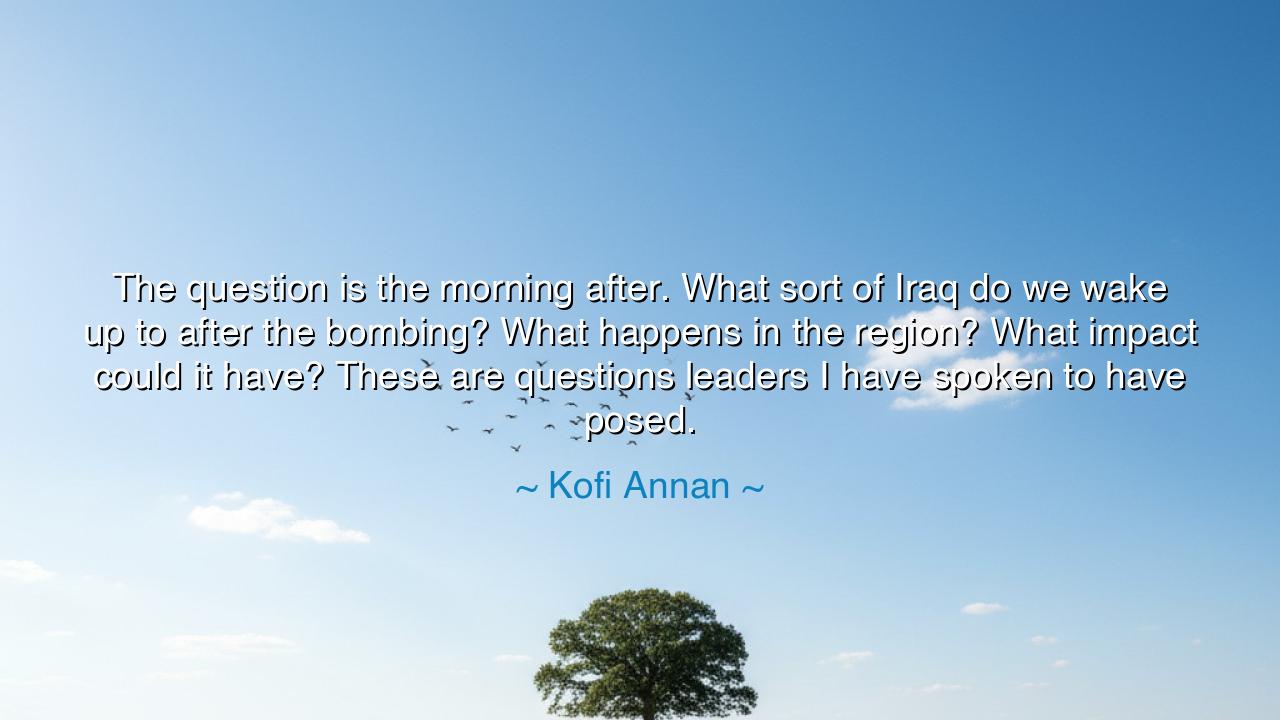
The question is the morning after. What sort of Iraq do we wake
The question is the morning after. What sort of Iraq do we wake up to after the bombing? What happens in the region? What impact could it have? These are questions leaders I have spoken to have posed.






When Kofi Annan declared, “The question is the morning after. What sort of Iraq do we wake up to after the bombing? What happens in the region? What impact could it have? These are questions leaders I have spoken to have posed,” he was not speaking as a mere observer of events, but as a guardian of humanity, burdened with foresight. His words were uttered in the shadow of war, when nations debated the invasion of Iraq in 2003. While others spoke of strategy and weapons, Annan asked of consequences, of aftermath, of the fragile dawn that follows destruction. His wisdom was not rooted in the thunder of arms, but in the silence of the morning after, when war reveals what it has sown.
The meaning of his words is profound: any act of violence, however justified in the eyes of its makers, births not only immediate ruin but also an uncertain tomorrow. The bombs may fall in a night of fire, but the morning after brings not victory alone, but widows, orphans, and the smoldering ruins of trust between peoples. Annan calls us to remember that true leadership does not only count the battles won, but measures the world awakened when the dust settles. His voice is that of the ancient prophets, who warned kings that glory in war is fleeting, but the scars of war endure for generations.
The ancients themselves knew this truth. Consider the Trojan War, immortalized by Homer. For ten years, Greek kings sought glory, plunder, and vengeance, yet the “morning after” Troy’s fall was not triumph, but sorrow. The Greeks returned home to find their own houses cursed: Agamemnon slain, Odysseus wandering, Achilles dead. The flames of Troy spread far beyond its walls. Annan’s words echo this same lesson—that war, once unleashed, rarely ends where its authors intend, but ripples outward, reshaping lands, peoples, and destinies in ways unforeseen.
History offers us too the tale of World War I, “the war to end all wars.” Leaders believed it would be swift, decisive, a cleansing fire. Instead, the “morning after” brought shattered empires, broken economies, and a generation scarred. Worse still, from its ashes rose resentments that birthed an even greater war. The lesson is unmistakable: to ignore the “morning after” is to plant seeds of destruction in the soil of tomorrow. Annan, speaking with the weight of history behind him, sought to awaken leaders to this reality before it was too late.
But his words also carry a moral dimension. The question is not merely political but human. “What sort of Iraq do we wake up to?” is also “What sort of children will rise tomorrow in the ruins of today?” Will they inherit peace, or the hunger for vengeance? Will the region breathe stability, or suffocate in chaos? To ask these questions is to elevate morality above strategy, compassion above conquest. Annan reminds us that the true cost of war is not counted in armies, but in the lives of ordinary people who must live in its aftermath.
The lesson, then, is clear: wisdom requires foresight. Before we act, we must envision the dawn that follows our choices. In war, in politics, in daily life, we must ask not only, “What can I achieve?” but, “What will remain once the fire has burned out?” To act without foresight is folly; to plan only for the strike and not the morning after is to doom the future.
Practically, this teaching calls us to pause before choices of anger, ambition, or haste. Whether in the halls of power or in our personal lives, let us ask: what will this look like tomorrow? Will my words sow peace or division? Will my actions heal or wound? To live in this way is to become a leader in one’s own sphere, for it is foresight, compassion, and restraint that define true greatness.
Thus, Kofi Annan’s words, spoken in a time of turmoil, remain timeless. The morning after is always coming—for nations, for families, for each of us. The question is what kind of world, what kind of relationship, what kind of soul we shall wake up to. Let us therefore act with foresight, sowing not destruction but seeds of peace, so that the dawn which follows our deeds may be one of hope, not ruin.






AAdministratorAdministrator
Welcome, honored guests. Please leave a comment, we will respond soon